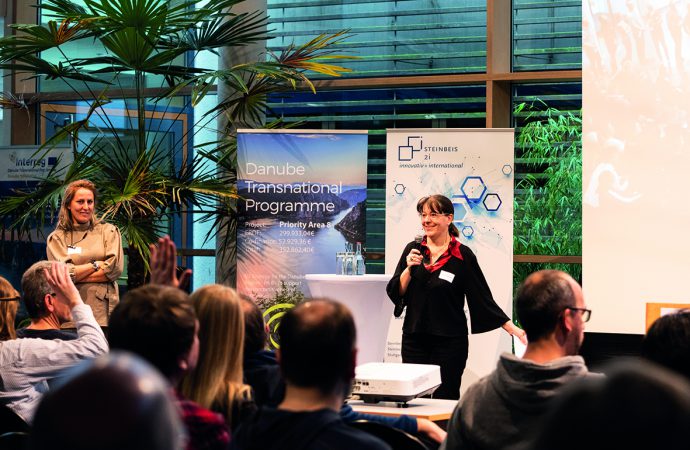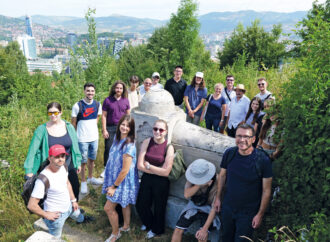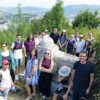“Danube Competitiveness in Practice: Smart Cities – Innovative Digital Business Perspectives for SMEs” – this was the motto of an event organised by the working groups of Priority 8 of the EU Danube Region Strategy (PA8 EUSDR), “Digital Danube” and “Innovation and Technology Transfer”. The working groups are led by Prof. Dr. Hertweck from Reutlingen
“Danube Competitiveness in Practice: Smart Cities – Innovative Digital Business Perspectives for SMEs” – this was the motto of an event organised by the working groups of Priority 8 of the EU Danube Region Strategy (PA8 EUSDR), “Digital Danube” and “Innovation and Technology Transfer”. The working groups are led by Prof. Dr. Hertweck from Reutlingen University and Daniela Chiran from the Steinbeis Europazentrum.
More than one hundred visitors took part in the three-day BarCamp, organized by the Hermann Hollerith Centre and the Centre for Digitization (ZD.BB).
Dr. Judit Schrick-Szenczi gave an introductory impulse lecture to “Danube Competitiveness in Practice: Smart Cities – Innovative Digital Business Perspectives for SMEs”. Schrick-Szenczi is coordinator of the PA8 of the EUSDR, which aims at promoting the competitiveness of SMEs in the Danube region. Paul Nemeth, member of the Baden-Württemberg state parliament, spoke on the challenges for smart cities of the future, open society and sustainability. He sees great opportunities in the future, especially in the Internet of things (IoT) and sensor technology.
On the first day there were presentations of concrete examples of the usually rather abstract topic of “digital business perspectives”, such as how water consumption in Croatia can be reduced with the help of LoRaWAN sensors.
Following the presentations, the second and third day offered the opportunity to deepen what had been heard with experts in workshops in the BarCamp.
In a pleasant, relaxed atmosphere, the participants were able to participate in one-hour workshops on topics such as digitization, IT, entrepreneurship, innovation, start-ups, social media and society.
“Companies often do not realise what can be achieved with these new technologies. That is why co-operation is immensely important.”
Prof. Albena Antonova
Albena Antonova, professor at the Faculty of Mathematics and Computer Science at the University of Sofia, gave a positive report on the special format of the Barcamp: “This was my first experience with a Barcamp and it was a great opportunity to exchange ideas with interesting people from different disciplines.” She led three workshops on different topics: The future of work, Open Science, trust in society.
BarCamp 2030 – What are the benefits for small and medium businesses?
In the closing remarks, the plenum discussed which topics could be important for SMEs in 2030. The companies will work in agile projects and use data to offer creative new services. This requires access to an open data pool. The responsibility for the progress of digital transformation will be shared between the managers of SMEs, governments and the educational level of the Danube region’s population.
Prejudices and fears of these issues have yet to be overcome. What we are dealing with today may be a matter of course in the world of work in 2030.
Lara Geller,
danube connects, Ulm
Priority area 8 (PA 8) of the EU Strategy for the Danube Region focuses on promoting the competitiveness of enterprises in the Danube Region. The Ministry of Economics, Labour and Housing of Baden-Württemberg, together with the Ministry of Economics of Croatia, is responsible for coordinating this process. The PA 8 working groups currently in existence are dedicated to the topics of innovation and technology transfer, digitisation, artificial intelligence, women in entrepreneurship, clusters and regional development.



















